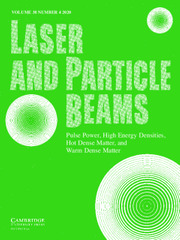Article contents
Finite-element simulation code for high-power magnetohydrodynamics
Published online by Cambridge University Press: 09 March 2009
Abstract
We describe the mathematical basis and organization of Crunch, a ID shock-hydrodynamics code to analyze pulsed-power experiments at Los Alamos National Laboratory. The program uses finite-element methods that preserve stability during material collisions and shock convergence on axis. It handles coupled calculations of nonlinear magnetic diffusion to simulate imploding liners. These calculations may be driven by multiple current waveforms or a selfconsistent current variation derived from a pulsed-power generator model. Crunch incorporates elastic material contributions and calculates element break and melt points. The primary goal in program development was effective use by experimentalists. Crunch is controlled by a streamlined script language and runs on standard personal computers. An interactive graphical postprocessor expedites analysis of results. To support the program we have assembled data resources in machine-independent format including Sesame equation-of-state tables, a material strength library and a library of temperature-dependent conductivities.
- Type
- Research Article
- Information
- Copyright
- Copyright © Cambridge University Press 1998
References
REFERENCES
- 2
- Cited by


